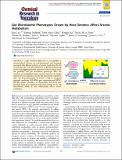| dc.contributor.author | Lu, Kun | |
| dc.contributor.author | Mahbub, Ridwan | |
| dc.contributor.author | Cable, Peter Hans | |
| dc.contributor.author | Ru, Hongyu | |
| dc.contributor.author | Parry, Nicola M. A. | |
| dc.contributor.author | Bodnar, Wanda M. | |
| dc.contributor.author | Wishnok, John S. | |
| dc.contributor.author | Styblo, Miroslav | |
| dc.contributor.author | Swenberg, James A. | |
| dc.contributor.author | Fox, James G. | |
| dc.contributor.author | Tannenbaum, Steven Robert | |
| dc.date.accessioned | 2015-04-23T18:26:57Z | |
| dc.date.available | 2015-04-23T18:26:57Z | |
| dc.date.issued | 2014-02 | |
| dc.date.submitted | 2013-12 | |
| dc.identifier.issn | 0893-228X | |
| dc.identifier.issn | 1520-5010 | |
| dc.identifier.uri | http://hdl.handle.net/1721.1/96754 | |
| dc.description.abstract | Large individual differences in susceptibility to arsenic-induced diseases are well-documented and frequently associated with different patterns of arsenic metabolism. In this context, the role of the gut microbiome in directly metabolizing arsenic and triggering systemic responses in diverse organs raises the possibility that gut microbiome phenotypes affect the spectrum of metabolized arsenic species. However, it remains unclear how host genetics and the gut microbiome interact to affect the biotransformation of arsenic. Using an integrated approach combining 16S rRNA gene sequencing and HPLC-ICP-MS arsenic speciation, we demonstrate that IL-10 gene knockout leads to a significant taxonomic change of the gut microbiome, which in turn substantially affects arsenic metabolism. | en_US |
| dc.description.sponsorship | National Institute of Environmental Health Sciences (P30 ES010126) | en_US |
| dc.description.sponsorship | National Institute of Environmental Health Sciences (NIEHS grant P30 ES002109) | en_US |
| dc.description.sponsorship | University of Georgia. College of Public Health (internal grant) | en_US |
| dc.description.sponsorship | University of Georgia (Faculty Research Grant (FRG)) | en_US |
| dc.language.iso | en_US | |
| dc.publisher | American Chemical Society (ACS) | en_US |
| dc.relation.isversionof | http://dx.doi.org/10.1021/tx400454z | en_US |
| dc.rights | Article is made available in accordance with the publisher's policy and may be subject to US copyright law. Please refer to the publisher's site for terms of use. | en_US |
| dc.source | American Chemical Society | en_US |
| dc.title | Gut Microbiome Phenotypes Driven by Host Genetics Affect Arsenic Metabolism | en_US |
| dc.type | Article | en_US |
| dc.identifier.citation | Lu, Kun, Ridwan Mahbub, Peter Hans Cable, Hongyu Ru, Nicola M. A. Parry, Wanda M. Bodnar, John S. Wishnok, et al. “Gut Microbiome Phenotypes Driven by Host Genetics Affect Arsenic Metabolism.” Chemical Research in Toxicology 27, no. 2 (February 17, 2014): 172–174. © 2014 American Chemical Society. | en_US |
| dc.contributor.department | Massachusetts Institute of Technology. Department of Biological Engineering | en_US |
| dc.contributor.department | Massachusetts Institute of Technology. Department of Chemistry | en_US |
| dc.contributor.department | Massachusetts Institute of Technology. Division of Comparative Medicine | en_US |
| dc.contributor.mitauthor | Lu, Kun | en_US |
| dc.contributor.mitauthor | Parry, Nicola M. A. | en_US |
| dc.contributor.mitauthor | Wishnok, John S. | en_US |
| dc.contributor.mitauthor | Fox, James G. | en_US |
| dc.contributor.mitauthor | Tannenbaum, Steven Robert | en_US |
| dc.relation.journal | Chemical Research in Toxicology | en_US |
| dc.eprint.version | Final published version | en_US |
| dc.type.uri | http://purl.org/eprint/type/JournalArticle | en_US |
| eprint.status | http://purl.org/eprint/status/PeerReviewed | en_US |
| dspace.orderedauthors | Lu, Kun; Mahbub, Ridwan; Cable, Peter Hans; Ru, Hongyu; Parry, Nicola M. A.; Bodnar, Wanda M.; Wishnok, John S.; Styblo, Miroslav; Swenberg, James A.; Fox, James G.; Tannenbaum, Steven R. | en_US |
| dc.identifier.orcid | https://orcid.org/0000-0002-2325-552X | |
| dc.identifier.orcid | https://orcid.org/0000-0001-9307-6116 | |
| mit.license | PUBLISHER_POLICY | en_US |
| mit.metadata.status | Complete | |
